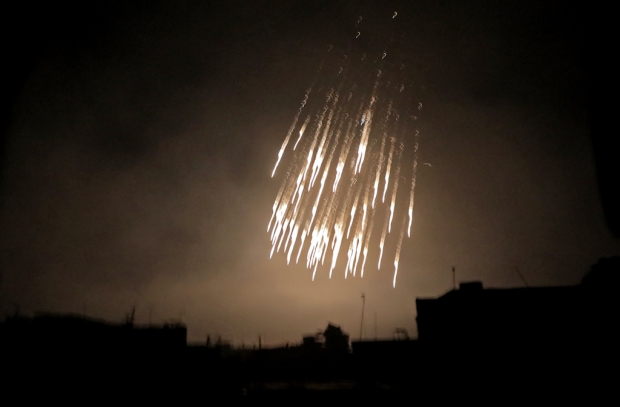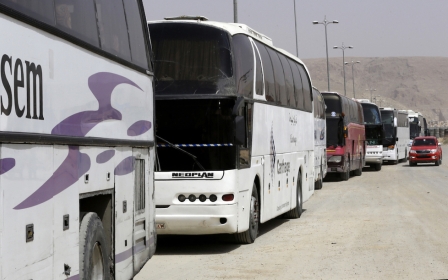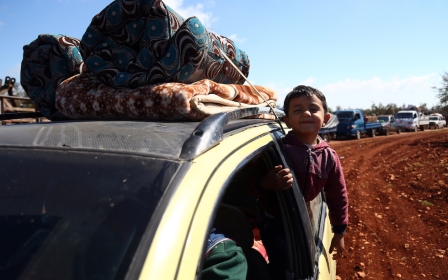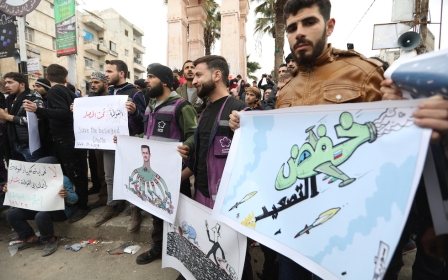‘Death and destruction all over’: Ghouta residents brave intense fighting to stay
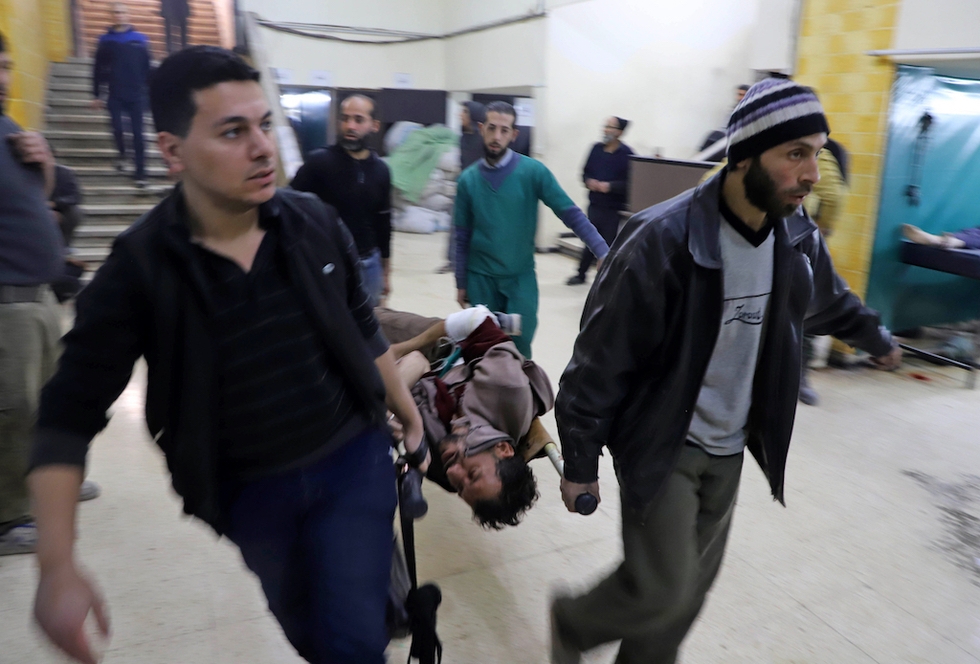
Thousands of Syrians have fled from the shrinking rebel enclave of Eastern Ghouta to government areas since February as government forces continue to take neighbourhoods in the brutal battle.
But others are fleeing deeper into rebel territory. They fear the government and seek to avoid them at all costs.
'We couldn’t imagine after all these years going back to the regime. Leaving behind what we have been building and fighting for'
- Um Ahmad, mother of five
Um Ahmad is one of them. A mother of five and the wife of a former fighter, she left her neighbourhood Masraba a month ago as the government advanced, leaving behind most of her possessions and braving mortar bombs all around her.
She made her way to Douma – one of the last rebel-controlled areas. Despite the nonstop bombings, she thinks staying among the rebels is her best chance at survival.
“I could lose my husband forever,” she told Middle East Eye on the prospect of going to safer areas held by the government. “I am ready to sacrifice here until the end.”
The people in the increasingly small rebel territories face an uncertain and difficult future as the government continues to advance.
Um Ahmad said she was staying in a basement as of 21 March with little food. Leaving Eastern Ghouta would spell a failure of the revolution and subsequent armed struggle that she doesn’t want to face.
“We couldn’t imagine after all these years going back to the regime,” she said over the phone. “Leaving behind what we have been building and fighting for.”
Despite her support for the rebel cause, she’s critical of the groups’ failure to stop the government offensive.
“The FSA didn’t act to stop the regime, despite the big arsenal they have,” she said.
More than 1,000 dead
The government began a major offensive to take Ghouta on 19 February, and split the rebel-held territory up on 11 March. The fighting has left more than 1,500 dead, and caused immense damage to Ghouta’s infrastructure, which has been pounded by Syrian air force bombs.
Rebel groups have also shelled government-held areas of Damascus during the fight. Several thousand people have gone from rebel areas to government ones during the advance, amid reports from Syrian state media of rebels shooting at people to prevent this, which rebels deny. Others have stayed in rebel areas like Um Ahmad.
On 22 March, an agreement was reached for rebel fighters and their families to evacuate the Harasta neighbourhood to rebel territories in the northwest of the country, according to the Syrian Observatory for Human Rights.
This leaves only Douma and Arbin and areas near Arbin in rebel control, and both are surrounded by the government. Jaish al-Islam, an Islamist group, is the dominant rebel force in the area.
The government's success in Ghouta is part of its momentum since the Russian intervention in 2015, which led to the victory in Aleppo at the end of 2016. The government has also benefited from rebel infighting in Ghouta, where Jaysh al-Islam has clashed with Faylaq al-Rahman and Hiyat Tahrir al-Sham, formerly the al-Qaeda affiliate Nusra Front.
'Not a safe passage'
Others remaining in rebel areas of Eastern Ghouta share Um Ahmad’s bleak view. Safwan Alo left his home with his wife and kids in Al Shefoney when government forces took it on 3 March. They bounced around rebel neighbourhoods before coming to Douma, where they are now. His travels were nightmarish.
“In those days it was like judgement day,” he told MEE by phone. “Death and destruction all over.”
Fed up with a life of war, Alo wants to leave Ghouta, but only under certain circumstances.
“We want to leave from here, not through regime or Russian corridors for sure. It’s not a safe passage for us. We don’t know if they will arrest us or leave us alive,” he said.
“Everyone here is desperate to leave. However, they are frightened by what will happen to them after going through these corridors.”
Jaish al-Islam’s fighters are defiant despite defeat being all but certain.
“They have been relentlessly trying to gain more area, destroying buildings and clearing the path to the ground forces, which have succeeded so far in many areas,” Maher al-Ghoutani, a soldier from the Arbin area, told MEE. "We are doing what we are capable of so far and always will.”
Al-Ghoutani said that the different groups are working together, and denies rebels are preventing people from leaving. He has no intention to leave himself, nor stop fighting.
“I hope we will fight the regime until the end, we will not leave the east and will fight until the last man,” he said.
“We will continue fighting here and everywhere we could as long as we have breath running blood in our bodies.”
Starving under rubble
Staying in Eastern Ghouta means staying in horrible conditions from the war.
“Relentless strikes, very little food…Entire families in tatters on the roads,” Sara Kayyali, a researcher at Human Rights Watch, told MEE.
Kayyali said bombing has been nonstop and that many families are staying in basements to avoid death, and that the healthcare situation is deteriorating.
“Doctors claim to receive hundreds of injured a day, and more are stuck under the rubble,” she said.
She echoed concerns that people going to government territory could face detention or worse, citing past executions of civilians.
“The current choice is between staying and risking death, and leaving and risking retaliation,” said Kayyali.
A government win in Ghouta would be another crucial step in President Bashar al-Assad’s goal of re-establishing himself as the sole authority in Syria.
Some argue that the government capture of territories constitutes a significant blow to the alternative the opposition presented to the Syrian people following the revolution in 2011, especially as people return to government rule.
“Some people have been trying to escape, and now feel freed from militants they never really liked,” Ammar Waqqaf, a frequent commentator on Syria, told MEE. “In 2015, it became obvious the government wasn’t going to fall, and people began to question the sanity of the struggle.”
Waqqaf said that images of Assad walking out in the open in Eastern Ghouta were important for his quest for legitimacy after seven years of war, and aimed to portray government areas as more stable than rebel ones.
“It sent a message that life is definitely more normal than in their areas,” said Waqqaf. “Such a video showing the president, a target, driving around easily is a message of defiance.”
Until a solution or a complete government victory is reached, Alo will stay put, hoping for a UN-brokered evacuation from his part of the city.
“They should guarantee our safety,” he said. “Otherwise we would rather stay here and not die in the regime's jails.”
Middle East Eye propose une couverture et une analyse indépendantes et incomparables du Moyen-Orient, de l’Afrique du Nord et d’autres régions du monde. Pour en savoir plus sur la reprise de ce contenu et les frais qui s’appliquent, veuillez remplir ce formulaire [en anglais]. Pour en savoir plus sur MEE, cliquez ici [en anglais].


